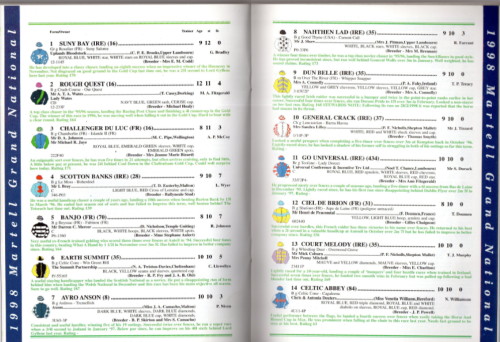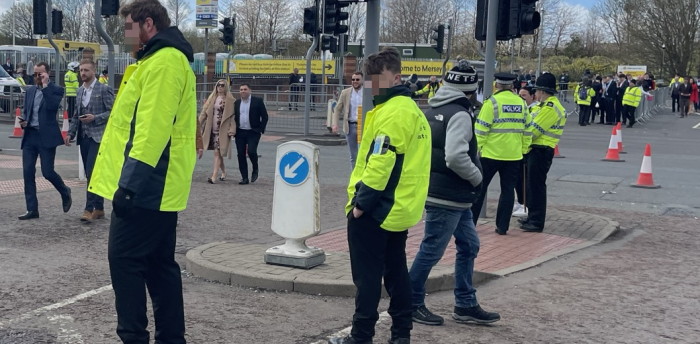A year on from the 1997 Grand National, which had to be postponed due to a bomb threat and it will come as no surprise to know that the crowd for this event was smaller than we are used to.
On Grand National day itself, just over 46,000 were in attendance, healthy numbers, but down 11,000 from the previous two years. This was the smallest crowd since 1985.
Results
| Result | Horse | Starting Price | Age | Handicap | Prize Money | Jockey | Trainer |
|---|---|---|---|---|---|---|---|
| 1 | Earth Summit | 7/1 | 10 | 10-5 | £212,569 | Carl Llewellyn | Nigel Twiston-Davies |
| 2 | Suny Bay | 11/1 | 9 | 12-00 | £80,071 | Graham Bradley | Charlie Brooks |
| 3 | Samlee | 8/1 | 9 | 10-1 | £39,586 | Richard Dunwoody | Philip Hobbs |
| 4 | St Mellion Fairway | 20/1 | 9 | 10-1 | £17,503 | Andrew Thornton | Paul Webber |
| 5 | Gimme Five | 25/1 | 11 | 10-00 | £8,301 | Ken Whelan | E J O’Grady |
| 6 | Killeshin | 25/1 | 12 | 10-00 | £4,621 | Sean Curran | H J Manners |
Non Finishers
What Happened In The 1998 Grand National?

In terms of the race itself, things were tough on the competitors this season. 37 went to post and started the race, just six managed to complete the course without mishap.
Earth Summit was sent off as the 7/1 favourite for the race, and he came home as the winner, landing the contest by a winning margin of 11 lengths. Suny Bay, an 11/1 shot, was second, and these two were well clear of the remaining four who finished.
Anyone who remembers this race will know that Earth Summit was a strongly fancied runner on the day, backed in from a morning price of 10/1 after rain fell on the course and people latched onto the fact that he loves the mud. He won the Welsh National in bad conditions a few months earlier and was a previous winner of the Scottish National, the race looked perfect and that was proved right.
Carl Llewellyn was the rider on the day and picked this up as a spare after regular jockey Tom Jenks was injured before the day of the race. Prominent throughout the race, Earth Summit kicked clear at the final fence to win a gruelling contest by 11 lengths.
The only former runner to take part was the 1996 winner Rough Quest. He was initially favourite but drifted when the rain came and arrived on the back of a fall in the Cheltenham Gold Cup just 16 days earlier. As expected, the ground took its toll and he was eventually pulled up.
Small Crowd Due To Uncertainty
 The crowd on the day was the lowest we have seen at the Grand National since 1985. This was of course, in the most part, due to the bomb incident that took place a year earlier in 1997. Many were put off from attending this event specifically, some put off attending big sporting events altogether.
The crowd on the day was the lowest we have seen at the Grand National since 1985. This was of course, in the most part, due to the bomb incident that took place a year earlier in 1997. Many were put off from attending this event specifically, some put off attending big sporting events altogether.
Aintree did things in the right manner though, toughening checks to get into the racecourse, providing additional security and doing everything possible to put their customers at ease. The race day was seen as a big test to see what the course and the Jockey Club had learnt from the year before, and based on talk afterwards, they did all they could to provide a safe environment.
Conditions Perfect For Winner Earth Summit
When the rain came ahead of the contest, this was not going to be a normal Grand National. A specific type of horse was needed, one who loved the mud and who needed a real stamina test. For Earth Summit, this was perfect.
He may not have been the best-handicapped runner in the field or the up-and-coming horse to watch, but he was perfect for the day and took full advantage to take home the prize.
Moments Of Note
- The 1988 Grand National was watched by over 46,000 people on course, making it the lowest attended since 1985
- Conditions on the day gave a gruelling test, just six of the 37 starters managed to complete
- Unlucky jockey Tom Jenks should have ridden the winner but was injured before the day, so Carl Llewellyn stepped in his place
